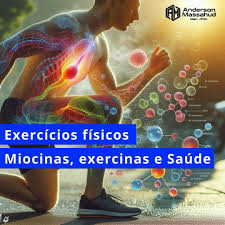The effects of myokines and exercins on health
DOI:
https://doi.org/10.61661/congresso.cbmev.7.2024.134Keywords:
myokines, exerkines, exercise, physical activity, healthAbstract
Introduction: Among the pillars of Lifestyle Medicine (SEM), the literature highlights the benefits of physical activity in the management of chronic non-communicable diseases (NCDs) and for health in general. These benefits result from the action of signaling molecules, with effects on several systems of the body, called “myokines”, released directly by skeletal muscles, now recognized as an endocrine organ, and “exerkines”, generated in different parts of the body in response to physical exercise. Objective: To explore the relationships between myokines/exerkines and NCDs, focusing on their mechanisms. Methodology: An “overview” literature review was carried out with the descriptors “myokines”, “exerkines”, “exercise”, “physical activity” and “health” in the PubMed database, including meta-analyses, systematic reviews and literature reviews published between 2019 and 2024. After applying inclusion and exclusion criteria, 61 articles were selected. Results: Myokines and exercins were found to have a direct impact on metabolism, inflammation, obesity, type II diabetes, cardiovascular diseases, brain physiology, neurodegenerative diseases and neoplasms. These molecules influence metabolism and muscle growth, have immunoregulatory effects and act on the systemic inflammatory response, neurotransmission, neuroplasticity and cytotoxicity. In addition, their effects help to explain how the absence of their production and release, caused by physical inactivity and sedentary lifestyle, is associated with insulin resistance, poor glycemic control and metabolic conditions, such as metabolic syndrome, Alzheimer's disease, obesity and cardiovascular diseases. Conclusion: Lifestyle interventions, especially physical exercise, are essential in the prevention of NCDs, through myokines and exercins. These molecules regulate metabolism and inflammation, contributing to the control of diseases such as obesity and type II diabetes. Physical activity should be encouraged as an effective prevention strategy, with new directions for research and clinical applications.
References
MARK, Wolfgang; MOSELEY, et al. Nutritional psychiatry: the present state of the evidence. Proc. Nutr. Soc. v.76, n.4, p.427-436, Nov. 2017. https://doi.org/10.1017/s0029665117002026 https://pubmed.ncbi.nlm.nih.gov/28942748/ Acesso em: 28 Abr. 2023. DOI: https://doi.org/10.1017/S0029665117002026
World Health Organization (WHO). World mental health report: transforming mental health for all. World Health Organization. Disponível em: https://apps.who.int/iris/handle/10665/356119. Acesso em: 28 Abr. 2023.
BEAR, Tracey L. K.; et al. The Role of the Gut Microbiota in Dietary Interventions for Depression and Anxiety. Adv. Nutr. v.11, n.4, p.890-907. 1 Jul. 2020. https://doi.org/10.1093/advances/nmaa016 DOI: https://doi.org/10.1093/advances/nmaa016
FURMAN, David. et al. Chronic inflammation in the etiology of disease across the life span. Nature Medicine, v. 25, p. 1822-1832, 05 Dez 2019. https://doi.org/10.1038/s41591-019-0675-0 https://www.ncbi.nlm.nih.gov/pmc/articles/PMC7147972/pdf/nihms-1578211.pdf DOI: https://doi.org/10.1038/s41591-019-0675-0
MUSCARITOLI, Maurizio. The Impacto of Nutrients on Mental Health and Well-Being: Insights From the Literatue. Front.Nutr. v.8, 656290, 8 Mar. 2021. https://doi.org/10.3389/fnut.2021.656290 https://pubmed.ncbi.nlm.nih.gov/33763446/ DOI: https://doi.org/10.3389/fnut.2021.656290

Downloads
Published
How to Cite
Issue
Section
License
Copyright (c) 2024 Sandrieli Carla Uhlig, Anna Beatriz Rambaldi Barcelar de Oliveira, Verônica Queji de Paula , Júlia Sanna Borges de Lima, Bruno Paula Caraça Smirmaul

This work is licensed under a Creative Commons Attribution 4.0 International License.
The VI Brazilian Congress of Lifestyle Medicine allows the author(s) to maintain their copyright without restrictions. Publications are licensed under the Creative Commons Attribution 4.0 International License - CC-BY


